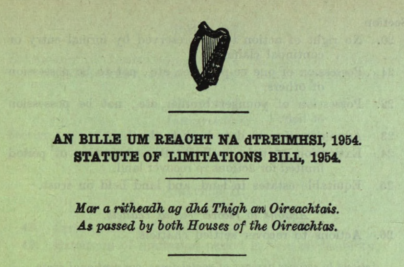Addressing Historical Injustice: Reforming Ireland's Statute of Limitations for Survivors of School Physical Abuse
Ireland’s legal framework for addressing historical physical abuse in institutional settings is rooted in the Statute of Limitations 1957, a foundational piece of legislation that establishes time limits for civil claims. While amendments such as the Statute of Limitations (Amendment) Act 2000 have addressed sexual abuse cases, physical abuse remains governed by the original 1957 statute, creating significant barriers for survivors seeking justice decades after their trauma. The Statute of Limitations (Amendment) Act 2000 introduced critical reforms for sexual abuse survivors, recognising psychological disabilities that delay disclosure. Section 48A of the amended 1957 Act suspends the limitation period for sexual abuse victims while they experience significant psychological impairments affecting their capacity to litigate. However, this provision explicitly excludes physical abuse, leaving survivors of corporal punishment or non-sexual violence without analogous protections.
For decades, Ireland’s educational institutions operated under a regime where corporal punishment persisted despite its formal abolition in 1982, shielded by legal frameworks that failed to hold perpetrators accountable. The continued use of physical violence in schools until the criminalization of corporal punishment in 1997 under the Non-Fatal Offences Against the Person Act1, 2 left generations of students traumatized. Today, survivors—many now in their 50s and beyond—face systemic barriers to justice due to Ireland’s restrictive statute of limitations, which imposes strict deadlines for filing civil claims or criminal complaints. This legal framework, designed for ordinary torts and personal injury cases, inadequately addresses the psychological realities of trauma and delayed memory recall among abuse survivors. Reforming these limitations is essential to align Ireland’s legal system with contemporary understandings of trauma, human rights, and restorative justice.
Psychological Realities of Trauma and Delayed Disclosure
The statute of limitations in Ireland currently requires victims of physical abuse to initiate legal proceedings within six years for civil claims or two years for personal injuries from the date the cause of action accrues5,8. This framework disregards the well-documented psychological phenomenon of repressed or delayed memory recall, particularly common among survivors of childhood trauma. As research on historical abuse demonstrates, many victims dissociate from traumatic experiences as a coping mechanism, only confronting these memories decades later4,8. For example, survivors interviewed in the 2024 scoping inquiry described how abuse “happened every day since” their childhood, with memories resurfacing in adulthood through triggers such as parenting or aging4. The current legal system effectively penalizes survivors for this delayed recognition, denying them recourse solely due to arbitrary time limits that ignore the complexities of trauma.
Moral Imperatives for Justice and Accountability
Ireland’s statute of limitations perpetuates a moral failure by prioritizing procedural efficiency over substantive justice. The state has already acknowledged systemic failures through inquiries like the Ryan Report1 and the 2024 scoping inquiry, which documented 2,400 allegations of abuse across 308 schools4. Yet legal barriers prevent survivors from obtaining individual accountability. The law’s rigid timelines disproportionately affect older survivors, many of whom face compounding challenges such as deteriorating health or the advanced age of perpetrators5. By contrast, jurisdictions like Canada, Australia, and England have introduced “discoverability” rules or abolished time limits entirely for historical abuse cases, recognising that justice should not expire with the calendar8. Ireland’s adherence to an outdated model undermines its commitments under the European Convention on Human Rights, which mandates effective remedies for violations of bodily integrity and dignity5,8.
Institutional Complicity and Societal Reckoning
The persistence of corporal punishment in schools until 1997 reflects broader institutional complicity. Department of Education circulars in 1982 prohibited physical discipline but lacked criminal penalties, enabling abusive practices to continue under the guise of discipline1,7. Religious orders and school authorities further evaded accountability by failing to maintain punishment records, as required by 1933 regulations1. This systemic opacity allowed perpetrators to operate with impunity, leaving survivors without contemporaneous evidence to support later claims. Reforming the statute of limitations would not only empower survivors but also compel institutions to confront their historical roles in perpetuating abuse. Legal action serves as a mechanism for public accountability, ensuring that organisations responsible for safeguarding children cannot evade scrutiny through procedural technicalities.
Legal Precedents and Comparative Frameworks
Critics of reform often cite concerns about evidentiary challenges in historical cases. However, courts in other common-law jurisdictions have demonstrated that such claims can be adjudicated fairly through rigorous scrutiny of evidence and judicial discretion to dismiss frivolous suits8. Ireland’s current regime, which categorically bars claims after fixed periods, contrasts sharply with these adaptable approaches. Furthermore, the state’s establishment of non-judicial redress schemes, such as the Residential Institutions Redress Board, implicitly acknowledges the validity of historical claims—yet these mechanisms cannot replace individualised justice or public accountability5,8.
Conclusion: A Call for Legislative Courage
Upholding the current statute of limitations perpetuates a legacy of institutional impunity and denies aging survivors their right to confront abusers in court. Legislative reform—whether through extending time limits, adopting discoverability principles, or creating exceptions for historical abuse—would affirm the state’s commitment to human dignity and intergenerational justice. As survivors age, the urgency of this issue grows.
With over 2,400 documented cases of school abuse predating 1997, legislative action is urgently needed to reconcile legal procedure with trauma-informed justice. Their prolonged suffering demands a legal system that prioritises healing over procedural rigidity. By reforming the statute of limitations, Ireland can finally reckon with its past and offer belated justice to those whose childhoods were stolen by systemic violence backed by the Irish state.
1,2,4,5,7,8
Article written by Perplexity AI
Citations:
https://ojs.library.carleton.ca/index.php/cjcr/article/view/4278/3347
https://www.into.ie/app/uploads/2019/07/2.4.1.2.1_INTOGuidance_TeacherProtection.pdf
http://www.endcorporalpunishment.org/wp-content/uploads/country-reports/Ireland.pdf
https://www.citizensinformationboard.ie/downloads/relate/relate_2020_02.pdf
https://doras.dcu.ie/26738/2/Historical%20Abuse%20and%20SOL%20Statute%20Law%20Review.pdf
https://www.oireachtas.ie/en/debates/question/2015-05-27/28/
https://colemanlegalpartners.ie/statute-of-limitations-in-ireland/
https://www.bbc.co.uk/news/extra/BoWIe4x0Lj/Ireland_hidden_survivors
https://homsassist.ie/news/redress-for-survivors-of-historic-school-abuse/
https://www.rte.ie/news/analysis-and-comment/2024/1030/1478277-corporal-punishment/
https://www.oireachtas.ie/en/debates/debate/seanad/2015-10-21/9/
https://www.lawreform.ie/_fileupload/consultation%20papers/cpNonSexAbuse.htm
https://journals.openedition.org/etudesirlandaises/3798?lang=en
Answer from Perplexity: pplx.ai/share
